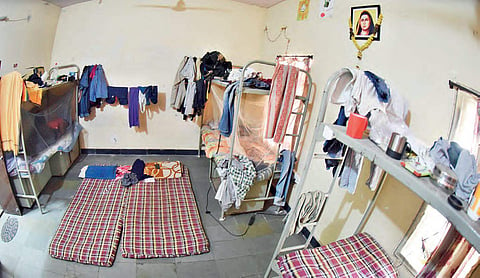

VIJAYAWADA: As many as 210 women are living in a space meant to accommodate 60 at the Government Working Women's hostel (GWWH) at Suryaraopet in Vijayawada.
The working women's hostels are the most sought after by economically weak women who want to live away from home for work or education. But since there is only one hostel per district, not many women manage to secure shelter in these hostels. The district Women and Child welfare department has initiated a proposal, which is pending since 2017, for a new building and an additional hostel for Krishna district.
GWWH Vijayawada, however, lacks proper facilities and services like clean washrooms, permanent cooks, helpers, watchmen etc. The monthly hostel fee is Rs 1584, out of which Rs 960 is the mess charge and the remaining Rs 624 is the hostel charge.
Apart from the monthly rentals, women are supposed to share the amount for the monthly salary of the cook, two helpers, the watchman and the municipal scavenger responsible for washroom maintenance. Therefore, the women are burdened with an additional amount ranging from Rs 500-700 every month.
Speaking to TNIE, Poornima, Superintendent of the hostel, said, "Currently, we are staying on rent in the Municipal Corporation building. The monthly rent they take is Rs 40,000. But only Rs 56,000 have been allocated to us for three months and thus we have almost over Rs 10 lakh dues pending to be paid to the VMC. The government, which is supposed to provide the staff, has not been doing so for a long time. So the girls have pitched in themselves to hire a cook and two helpers."
The hostel lacks basic facilities like sufficient fire safety equipment and first aid kit. Two fire extinguishers of about 4.5 kg each, which are available at the hostel, have passed their expiry date long back. The sanitary pad dispensing unit is never refilled, and hence it remains unused.
Each floor has 16 washrooms with broken tiles and doors, which are to be used by 105 women. Only eight of them are in proper condition. The rooms, very small in size, accommodate three girls. There are no beds, and the women have to sleep on the floor.
Ramya, a girl who is staying in the hostel says, "The sanitation is poor. The washroom drains get blocked once every month. Some doors don't have bolts, some washrooms don't even have doors. In summer, there is a shortage of water. Since the drinking water supplied to us is quite bad, we rely on water cans, which adds to our financial burden."
Speaking to Express, H Arun Kumar, Commissioner of WDCW, said, "We wanted to develop all working women hostels and give them a new look. We are working on them district by district. As of now, one hostel is under construction in Vizianagaram district, and another has been proposed in Krishna district."
Since there is insufficient space in government hostels, many private hostels are taking the lead. In Vijayawada, over 200 hostels are being operated by individuals with trade licenses either from the VMC or Women welfare department officials. But majority of these hostels also do not have fire safety equipment, according to the findings of recent inspections undertaken by the women welfare department officials.
According to government rules, all the hostels must be equipped with proper fire safety equipment based on the building layout. If hostels are in multi-storeyed buildings, then the building must possess a fire safety certificate, but hostel managements are not ensuring this.